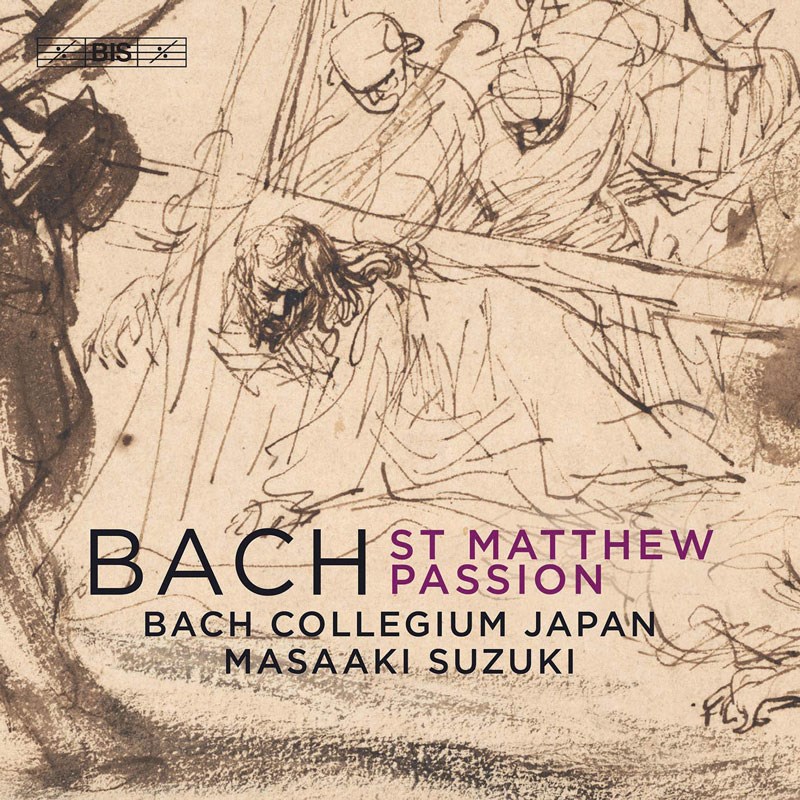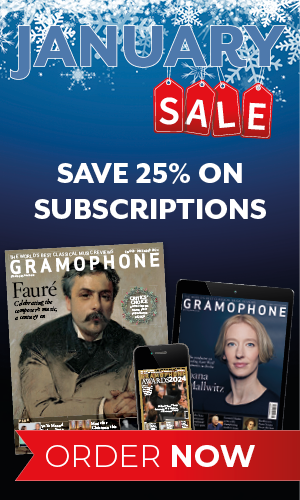The 10 Best Bach Works – A Beginner's List
Monday, January 31, 2022
Here are a selection of works by Bach that are essential listening; and once bitten the Bach Bug will take you on a journey of almost limitless reward

If music has a holy trinity the three names would probably be Bach, Mozart and Beethoven, but if that already shortest of shortlists is reduced to just one, the answer, in the words of Dylan Thomas’s Organ Morgan, is ‘Bach is best’. Throughout Bach’s long life, his achievement was staggering and is astounding in its size and ambition, and it is replete with masterpieces – works that stand like the peaks of a huge mountain range. Here are a selection of works by Bach that are essential listening; and once bitten the Bach Bug will take you on a journey of almost limitless reward.
● The 50 best Ludwig van Beethoven recordings
● The 50 best Wolfgang Amadeus Mozart recordings
● The 50 best Johannes Brahms albums
1. Orchestral Suites

Freiburg Baroque Orchestra / Petra Mullejans, Gottfried von der Goltz
(Harmonia Mundi)
Over the years, we’ve come to expect outstanding performances from the Freiburg Baroque Orchestra and this issue certainly does not disappoint. The four Orchestral Suites are supremely life-affirming music, fully realised here with playing that emphasises rhythmic vitality and poise, as well as giving inspiring expression to Bach’s wonderful melodic lines. There are some exceptional individual contributions: brilliant violin-playing in the Overture of the Third Suite, a beautifully matched trio of oboes and bassoon enlivening many moments in the First Suite and, in the Second Suite, Karl Kaiser’s immaculate flute-playing, with spectacular, stylish embellishments to the repeated sections.
2. Brandenburg Concertos Nos 1-6

European Brandenburg Ensemble / Trevor Pinnock
(Avie)
When Trevor Pinnock first recorded the Brandenburgs with the English Concert for DG Archiv in 1982, period performances of these works were relatively rare; today they abound, and it has become harder to make a mark in music that does not readily admit a wide range of interpretations. Not that Pinnock need worry about that at this point in his career. This recording, made with an ensemble hand-picked for the job, is a 60th-birthday present to himself, and is just what such a project should be: talented musicians relishing each other’s company in music of truly inspiring greatness.
3. Violin Concertos

Isabelle Faust, Akademie für Alte Musik Berlin
(Harmonia Mundi)
That Isabelle Faust and the Akademie für Alte Musik Berlin have let this Bach violin concertos album run to nearly 2 hours of music suggests a relish of their task that is mirrored triumphantly in the resultant music-making. Their choice of repertoire, too, feels driven by a desire to celebrate Bach’s life with the violin rather than document it. If they had wanted to be pedantically completist about it, we would have the Fifth Brandenburg and the Triple Concerto; instead we get the three known violin concertos plus the three most convincing reconstructions from harpsichord concertos, supplemented by a reconstruction of the putative early violin version of the B minor Flute Suite, and all neatly interspersed with arrangements of two of the organ sonatas and a clutch of cantata sinfonias (including the rarely heard, trumpet-and-drum-laden BWV1045, a violin concerto movement of some flashiness).
4. Goldberg Variations

Glenn Gould pf
(Sony, 1981 rec)
This truly astonishing performance was recorded in 1981, 26 years after Gould's legendary 1955 disc. Gould was not in the habit of re-recording but a growing unease with that earlier performance made him turn once again to a timeless masterpiece and try, via a radically altered outlook, for a more definitive account. By his own admission he had, during those intervening years, discovered 'slowness' or a meditative quality far removed from flashing fingers and pianistic glory. And it is this 'autumnal repose' that adds such a deeply imaginative dimension to Gould's unimpeded clarity and pin-point definition. The Aria is now mesmerically slow. The tremulous confidences of Variation 13 in the 1955 performance give way to something more forthright, more trenchantly and determinedly voiced, while Var. 19's previously light and dancing measures are humorously slow and precise. Variation 21 is painted in the boldest of oils, so to speak, and most importantly of all, Landowska's 'black pearl' (Var. 25) is far less romantically susceptible than before, has an almost confrontational assurance. The Aria's return, too, is overwhelming in its profound sense of solace and resolution.
5. Partitas

Igor Levit pf
(Sony Classical)
Complex music – but not complicated. Levit’s achievement is to miss nothing of their scope and variety as compositions while conveying what it is that makes each one a unity, not an anthology, demanding to be performed complete. Where other practitioners offer regular accents and a perhaps over-cautious traversal, tethered to the notes, Levit never fails to project a commanding overview – an aerial perspective, almost – in addition to the detail of phrasing and articulations and the nooks and crannies of melodic lines. Only the most gifted interpreters manage both. It energises his performances and makes them seem to inhabit a state of grace. And it contributes to our enjoyment in another way, drawing us on as we listen and keeping us curious as to what lies around the next corner. A first impression might be of quicker tempi than usual and of a fleetness that challenges us to keep up. Yet one quickly registers that nothing, in fact, is rushed or driven too hard – not a phrase or a paragraph, nor even (most important) the execution of an ornament.
6. Cello Suites

David Watkin vc
(Resonus)
As with so much mainstream repertoire, the catalogue is so full of recordings – good and bad – that there often has to be some form of abstract justification to qualify any further additions. David Watkin’s profound musicianship, though, is more than enough to accelerate this recording of Bach’s Cello Suites to the top of the tiny league of ‘definitive’ recordings, beyond the infinitesimal care of Ditta Rohmann (Hungaroton, 5/14, 11/14), the meticulous intellectualism of Anner Bylsma (Sony, 7/81, 1/93) or even the refined warmth of the benchmark Fournier performances (Archiv, 3/89): all encapsulate the vital elements of these works but none succeeds completely in covering them all.
7. The Well-tempered Clavier

Ewa Pobłocka pf
(NIFC)
Ewa Pobłocka’s Bach has everything going for it: pianistic resourcefulness, keen polyphonic acumen, impeccable taste and an ability to imbue each Prelude and Fugue with a distinct point of view borne out of musical considerations. You notice this from the start. Her C major Prelude unassumingly unfolds at a moderate pace, resonating less like a piano than a murmuring organ, while the C major Fugue sounds like a madrigal featuring four distinct yet unified voices with prodigious breath control. By contrast, the C minor Prelude and Fugue stands out for Pobłocka’s hard-hitting detached articulation. The C sharp major Prelude’s arching phrases remind me of Myra Hess’s similarly unpressured vintage recording, and her fluidly lyrical approach to the C sharp minor Fugue highlights the music’s harmonic poignancy yet appreciably minimises its austere reputation.
8. Solo Violin Sonatas & Partitas

Rachel Podger vn
(Channel Classics)
As a matter of tactics disregarding the printed order of the works, this second disc opens in the most effective way with a joyous performance of the ever-invigorating E major Preludio. At once we can recognize Podger's splendid rhythmic and tonal vitality (not merely Bach's marked terraced dynamics but pulsatingly alive gradations within phrases), her extremely subtle accentuations and harmonic awareness (note her change of colour at the move from E to C sharp major in bar 33), are all within total technical assurances. The Gavotte en Rondeau is buoyantly dance-like, and in the most natural way she elaborates its final statement (her stylish ornamentation throughout the Partita is utterly convincing). She takes the Giga at a restrained pace that allows of all kinds of tiny rhythmic nuances. Only a rather cut-up performance (for my taste) of the Loure stops this being one of the most enjoyable E major Partitas I can remember.
9. Mass in B minor

Dunedin Consort and Players / John Butt
(Linn)
There are few who strive sincerely to juxtapose the bedfellows of academic rigour and inspired musicianship. Given his recent Handelian activity at the helm of the Dunedin Consort and Players, some might have forgotten that John Butt is a Bach research specialist and author of the Cambridge Handbook on the Mass in B minor. In the booklet he explains his thoughts about historically informed performance practice (one voice per part, following the evidence outlined in the writings of Joshua Rifkin and Andrew Parrott), and discusses his choice to make the first recording of Rifkin’s recent edition (which reconstructs Bach’s score c1749, without later accretions). Butt’s interpretation owes firm allegiance to the “OVPP” creed that will not please everyone (even if detractors have not yet produced a single scrap of proof to refute it), but the Dunedin Consort and Players are never perfunctory or merely dogmatic. This performance demands to be heard.
10. St Matthew Passion

Sols; Bach Collegium Japan / Masaaki Suzuki
(BIS)
To embark on a second recording of the St Matthew Passion 20 or so years after an admired reading with many of the same musicians from Bach Collegium Japan might, one would imagine, have been governed by a specific set of motivations. On the evidence of this powerful, superbly framed and exceptionally judged account, Masaaki Suzuki may instead have reached a point where, over decades of intensely dedicated Bach performance, a revisiting simply became a necessary rite of passage – as it has for many before him.
Thank you for visiting...
We have been writing about classical music for our dedicated and knowledgeable readers since 1923 and we would love you to join them.
To find the perfect subscription for you, simply visit: gramophone.co.uk/subscribe















